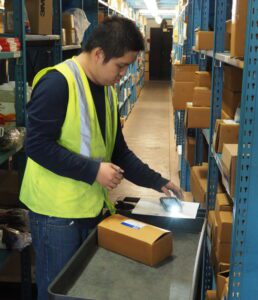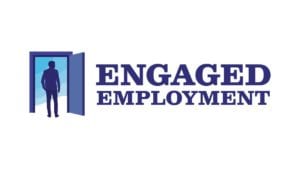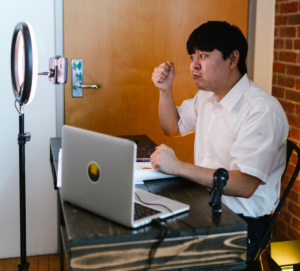Daniel is running a victory lap.
The 20-year-old just completed his 30-day review as a warehouse associate with flying colors. He’s pulling order tickets on his own and his co-workers like having him around. When asked how he’s doing, Daniel just smiles and says, “I love this job.”
Just over a month ago, Daniel was stranded in a state vocational training program making minimum wage. Now he’s earning $16 an hour (a 120% pay bump) with full-benefits. He was frustrated in the training program which dragged on for 10 months. He didn’t have a job coach and his case manager left and wasn’t replaced. He hated that he had to sit at a table packaging the same kits for 6 or 8 hours straight. Now he’s breezing around the warehouse of an electrical distribution business with his cart, filling orders using a hand-held ordering device.
 The business contacted Engaged Employment because it has a diversity initiative that includes hiring persons with disabilities. Jerry, the manager, is especially interested in hiring adults with autism and cognitive issues. Daniel isn’t autistic but he has multiple neurological impairments including Tourette’s syndrome and cerebral palsy.
The business contacted Engaged Employment because it has a diversity initiative that includes hiring persons with disabilities. Jerry, the manager, is especially interested in hiring adults with autism and cognitive issues. Daniel isn’t autistic but he has multiple neurological impairments including Tourette’s syndrome and cerebral palsy.
Jerry has developed a close and trusting relationship with Daniel. “I’m able to talk with him about what is going well and what needs to be worked on,” he said. The only major concern had to do with safety which was readily addressed by Jerry and Daniel’s Engaged Employment job coach.
It didn’t take long for Daniel to bond with his co-workers who all pitched in to support Daniel when he started working at the warehouse. “We had a food truck here for a branch lunch,” Jerry said. “When I dropped into the break room, Daniel was sitting with four or five guys having a conversation.”
Daniel’s success in his job underscores two important aspects of obtaining the “right” job for someone with a disability, especially if the issue is cognitive, intellectual or neurological: (1.) working with employers who care about adults having special needs and who desire to have diverse workplaces, and (2.) having a job coach who understands the need and incorporates customized employment practices.
The environment of a workplace is often just as important as meeting the interest and skill level of the employee. In Daniel’s case, Jerry was motivated to hire workers with disabilities. Not only did he want to help where there’s a need, but he could see how having someone like Daniel in the warehouse would benefit his staff.
“Every day Daniel comes in ready to work. He has a great attitude toward working here,” noted Jerry. “He sets an example for my other warehouse staff who sometimes have bad days or come in with other personal issues affecting them.” In this respect Daniel is a model for consistency. His type of disability resulted in experiencing bullying in school and feeling ignored or left on the outside looking in. Now he’s working with people who accept him for who he is and enjoy supporting him.
The problem with large, state vocational programs is they’re designed for training and employment preparation, not hands-on customized employment coaching. They are more of a “one size fits all” program where everyone is lumped together and treated the same. They don’t offer an individual approach. They are also limited to set terms like 90 days. In Daniel’s case, the term was extended but nothing changed to help him gain regular or what is called supportive employment.
Engaged Employment is centered around customized employment. There are no group settings or group programs. Unlike a government program, we call the people we help clients, not consumers. It begins with an assessment in the home with the client and parents or caregivers. The assessment is thorough and zeros in on the person’s interests, issues, education, and needs.
It’s important to note that Daniel, like many persons with intellectual or cognitive disabilities, has multiple issues. Problems like anxiety, depression, ADHD, or OCD all need to be taken into consideration in finding the right job for the individual.
The job coach then develops a customized employment plan that often includes community-based instruction in a nonprofit setting. What follows are job development or job searching, interviewing, and finally, on-the-job coaching. Since Engaged Employment is private pay, these services are broken down into segments to keep costs down. Like a popular commercial today, “You only pay for what you need.”
The combination of a business with the desire to diversify its workplace to include workers with special needs and a job coach using customized employment practices helped Daniel to get a job he not only likes, but in his words, loves.



